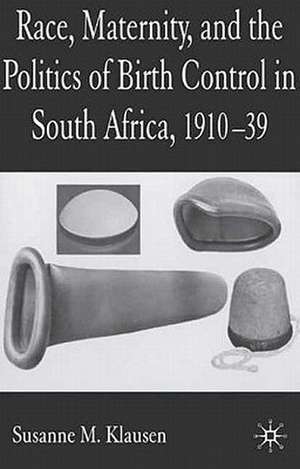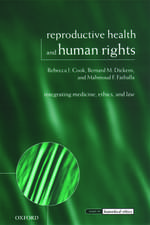Race, Maternity, and the Politics of Birth Control in South Africa, 1910-39
Autor S. Klausenen Limba Engleză Hardback – 12 noi 2004
| Toate formatele și edițiile | Preț | Express |
|---|---|---|
| Paperback (1) | 635.80 lei 6-8 săpt. | |
| Palgrave Macmillan UK – 2004 | 635.80 lei 6-8 săpt. | |
| Hardback (1) | 640.37 lei 6-8 săpt. | |
| Palgrave Macmillan UK – 12 noi 2004 | 640.37 lei 6-8 săpt. |
Preț: 640.37 lei
Preț vechi: 753.39 lei
-15% Nou
Puncte Express: 961
Preț estimativ în valută:
122.55€ • 127.17$ • 102.43£
122.55€ • 127.17$ • 102.43£
Carte tipărită la comandă
Livrare economică 15-29 martie
Preluare comenzi: 021 569.72.76
Specificații
ISBN-13: 9781403934529
ISBN-10: 1403934525
Pagini: 256
Ilustrații: XIX, 240 p.
Dimensiuni: 140 x 216 x 18 mm
Greutate: 0.42 kg
Ediția:2004
Editura: Palgrave Macmillan UK
Colecția Palgrave Macmillan
Locul publicării:London, United Kingdom
ISBN-10: 1403934525
Pagini: 256
Ilustrații: XIX, 240 p.
Dimensiuni: 140 x 216 x 18 mm
Greutate: 0.42 kg
Ediția:2004
Editura: Palgrave Macmillan UK
Colecția Palgrave Macmillan
Locul publicării:London, United Kingdom
Cuprins
Introduction Fears of National Decline and the Politics of Birth Control Eugenic Birth Control and the Poor-White Problem Strengthening the Nation's Mothers Through Birth Control The Failure of Eugenic Birth Control The Cape Town Mothers' Clinic State Support for Birth Control Conclusion Bibliography Index
Recenzii
'. . . A riveting read that should be of value to readers with an interest in medical and South African history, as well as the history of gender, race and eugenics.' - Shula Marks, Emeritus Professor of History, School of Oriental and African Studies, University of London
'This is a splendid work providing a detailed and nuanced account, meticuously located in space and time, of the development of birth control in South Africa, while clearly situating this within the wider international movement for reproductive control. Klausen does a first-class job of revealing the complex interaction of the various forces and interest groups involved with the issue in South Africa, and sheds light on parallel developments both in the British Empire and elsewhere.' - Dr Lesley A. Hall, Wellcome Library for the History and Understanding of Medicine
'This is a noteworthy book, written in clear and accessible style. While opening new areas for historical research, the book also offers a lucid, feminist analysis of a crucial area of health care in South Africa. It will find a central place in my social policy graduate course, and no doubt in a wide variety of other courses in history, political studies and sociology.' - Shireen Hassim, South African Historical Journal
'While focusing on South Africa, Klausen's study meticulously shows how the ideas and practices of the different birth control campaigners drew upon and influenced those being developed in othercountries such as Britain. For anyone interested in the history of birth control, Klausen's book provides a fascinating insight into the complex dynamics between ideology and the provision of services, as well as the influence of international and local politics on the networks that shaped access to contraception.' - Medical History
'Deservedly worth reading .. Altho
ugh it is possible to read this book as a history of contraception alone, it is much more than this. At roughly 150 pages, the book is easily manageable and would do nicely for students wanting to get their teeth into a book that deals with a coherent and gender-sensitive subject.' - H-SAfrica
'Thoroughly researched...it is a fascinating examination of the interrelationships between race, gender and birth control. But it is also a moving account of the suffering of Whites and Blacks, women, children and men, sunk into the bottomless pit of poverty.' - Laurette Geldenhuys, Canadian Bulletin of Medical History
'This is a splendid work providing a detailed and nuanced account, meticuously located in space and time, of the development of birth control in South Africa, while clearly situating this within the wider international movement for reproductive control. Klausen does a first-class job of revealing the complex interaction of the various forces and interest groups involved with the issue in South Africa, and sheds light on parallel developments both in the British Empire and elsewhere.' - Dr Lesley A. Hall, Wellcome Library for the History and Understanding of Medicine
'This is a noteworthy book, written in clear and accessible style. While opening new areas for historical research, the book also offers a lucid, feminist analysis of a crucial area of health care in South Africa. It will find a central place in my social policy graduate course, and no doubt in a wide variety of other courses in history, political studies and sociology.' - Shireen Hassim, South African Historical Journal
'While focusing on South Africa, Klausen's study meticulously shows how the ideas and practices of the different birth control campaigners drew upon and influenced those being developed in othercountries such as Britain. For anyone interested in the history of birth control, Klausen's book provides a fascinating insight into the complex dynamics between ideology and the provision of services, as well as the influence of international and local politics on the networks that shaped access to contraception.' - Medical History
'Deservedly worth reading .. Altho
ugh it is possible to read this book as a history of contraception alone, it is much more than this. At roughly 150 pages, the book is easily manageable and would do nicely for students wanting to get their teeth into a book that deals with a coherent and gender-sensitive subject.' - H-SAfrica
'Thoroughly researched...it is a fascinating examination of the interrelationships between race, gender and birth control. But it is also a moving account of the suffering of Whites and Blacks, women, children and men, sunk into the bottomless pit of poverty.' - Laurette Geldenhuys, Canadian Bulletin of Medical History
Notă biografică
SUSANNE M. KLAUSEN is Assistant Professor of African History at Carleton University, Ottawa. Her research focuses on the history and politics of reproduction in the South African and international context. She teaches courses on the history of Africa, South Africa, the Atlantic World, and medicine.











